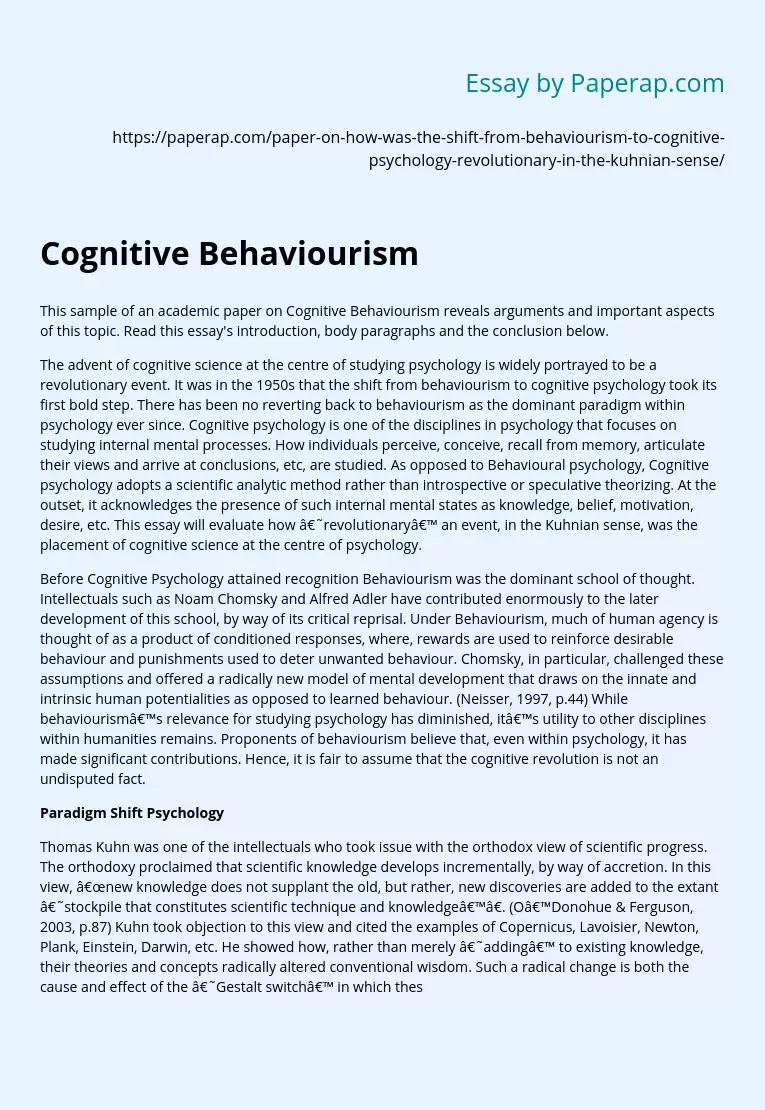Sample of an Academic Paper on Cognitive Behaviourism
The advent of cognitive science at the centre of studying psychology is widely portrayed to be a revolutionary event. It was in the 1950s that the shift from behaviourism to cognitive psychology took its first bold step. There has been no reverting back to behaviourism as the dominant paradigm within psychology ever since. Cognitive psychology is one of the disciplines in psychology that focuses on studying internal mental processes. How individuals perceive, conceive, recall from memory, articulate their views and arrive at conclusions, etc, are studied.
As opposed to Behavioural psychology, Cognitive psychology adopts a scientific analytic method rather than introspective or speculative theorizing. At the outset, it acknowledges the presence of such internal mental states as knowledge, belief, motivation, desire, etc. This essay will evaluate how ‘revolutionary’ an event, in the Kuhnian sense, was the placement of cognitive science at the centre of psychology.
Before Cognitive Psychology attained recognition Behaviourism was the dominant school of thought. Intellectuals such as Noam Chomsky and Alfred Adler have contributed enormously to the later development of this school, by way of its critical reprisal.
Under Behaviourism, much of human agency is thought of as a product of conditioned responses, where, rewards are used to reinforce desirable behaviour and punishments used to deter unwanted behaviour. Chomsky, in particular, challenged these assumptions and offered a radically new model of mental development that draws on the innate and intrinsic human potentialities as opposed to learned behaviour. (Neisser, 1997, p.44) While behaviourism’s relevance for studying psychology has diminished, it’s utility to other disciplines within humanities remains.
Proponents of behaviourism believe that, even within psychology, it has made significant contributions. Hence, it is fair to assume that the cognitive revolution is not an undisputed fact.
Thomas Kuhn was one of the intellectuals who took issue with the orthodox view of scientific progress. The orthodoxy proclaimed that scientific knowledge develops incrementally, by way of accretion. In this view, “new knowledge does not supplant the old, but rather, new discoveries are added to the extant ‘stockpile that constitutes scientific technique and knowledge’”. (O’Donohue & Ferguson, 2003, p.87) Kuhn took objection to this view and cited the examples of Copernicus, Lavoisier, Newton, Plank, Einstein, Darwin, etc. He showed how, rather than merely ‘adding’ to existing knowledge, their theories and concepts radically altered conventional wisdom. Such a radical change is both the cause and effect of the ‘Gestalt switch’ in which these scientists perceived basic phenomena in a fundamentally different manner. While revolution in scientific progress in thus backed up by empirical evidence, it still does not lead to the conclusion that cognitive psychology is one such.
Kuhn had written at length on the subject of scientific revolutions in his seminal 1960 work The Structure of Scientific Revolutions. Going by this understanding, the behavioural paradigm “was not shown to have ‘drowned in a sea of anamolies’, and was not usurped by the cognitive paradigm with a problem-solving exemplar better able to accommodate those anamolies.” (O’Donohue & Ferguson, 2003, p.85) Kuhn thus makes it clear that the perceived shift to the new paradigm is not a natural course of scientific evolution. The debate on whether the cognitive revolution actually occurred should be informed by this key observation of Kuhn’s.
It is easy to get carried away by the hype and popularity surrounding cognitive psychology. It is true that citations in scholarly journals underscore the ascendency of cognitive psychology. Such statistics also reveal how behavioural psychology is no longer the buzz within the scientific community. But one cannot take such trends as proofs for a bona fide scientific revolution. The trend merely illustrates “a sociological phenomenon – a change in allegiance, that, interestingly, may be due in part to the claim (which has immense rhetorical value) that a scientific revolution has indeed taken place.” (O’Donohue & Ferguson, 2003, p.86) That the Cognitive Revolution was a contested idea is learnt from numerous scholarly critiques the idea has drawn. For example, influential scholars such as Popper, Lakatos, Laudan and Gross have articulated their doubts about the verity of the revolution. To illustrate, one strong reason why one should be cautious in the acceptance of cognitive revolution is its implications for older disciplines within science. For example, the centuries old treatment of mind and consciousness is contested in cognitive science. The
“contents of conscious experience, with their subjective qualities, long banned as being mere acausal epiphenomena or as just identical to brain activity or otherwise in conflict with the laws of the conservation of energy, have now made a dramatic comeback. Reconceived in the new outlook, subjective mental states become functionally interactive and essential for a full explanation of conscious behaviour.” (Sperry, 1993, p.879)
Science’s constant pursuit of knowledge and truth leads to a quandary, whereby all scientific inquiry is directed toward gaining understanding of a few fundamental questions relating to the universe and human consciousness. If scientists are unable to unlock these basic secrets of our world, then science might soon hit a stumbling block around which it cannot get around. Those who are critical of the utility of scientific inquiry point out, that, even ascertaining answers to these fundamental questions might quench our curiosity but might prove of little practical utility. So, either scenario suggests an End of Science. On the other hand, people like Thomas Kuhn and Derek de Solla Price, celebrate the possibilities of science and its centrality to understanding limits of human knowledge and experience. They emphasize that instead of a linear-progressive model, scientific inquiry can just as well undertake a paradigm shift toward achieving more dynamism. They foresee “the capacity of human imagination and its potential-not just in pushing the limits of science.” (Bauer, 1997) But evidence is lacking to substantiate this quantum leap in the field of psychology.
Sample of an Academic Paper on Cognitive Behaviourism. (2019, Dec 06). Retrieved from https://paperap.com/paper-on-how-was-the-shift-from-behaviourism-to-cognitive-psychology-revolutionary-in-the-kuhnian-sense/

